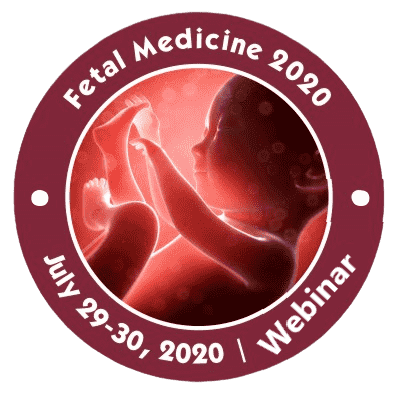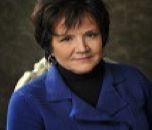Renowned Speakers
We’ve invited the top most influential speakers from around the world to give inspirational talks and lead practical workshops.
Conference Information
What People Say...

About the Conference
Fetal Medicine 2020 requests the honour of your presence at the reputable conference ''World Congress on Fetal and Maternal Medicine'', scheduled to be held on July 29-30, 2020 in Singapore. The esteemed conference has been designed with multidisciplinary sessions covering the entire spectrum of research and innovations in Fetal & Maternal medicine in order to deliver an exemplary scientific program. The conference will revolve around the theme 'Fostering the Innovations in Fetal & Maternal Medicine'.
Fetal Medicine 2020 serves as a best platform to meet the experts from industry and academia and to establish a scientific network with them. In support of revamping fetal & maternal care, this activity has been established by PULSUS Group, Ltd and Center for Education Development (CED). CED is jointly accredited by the Accreditation Council for Continuing Medical Education (ACCME), the Accreditation Council for Pharmacy Education (ACPE), and the American Nurses Credentialing Center (ANCC), to provide continuous education for the healthcare team.
The doctrine of our conference is to hold the manifestation for the attendees on the recent innovations and updates on the field, thus we make sure that the event comprises a blend of professionals such as maternal fetal medicine specialists, obstetricians, gynaecologists, veteran researchers, and women’s healthcare professionals from academia and industry making the 'Fetal Medicine 2020' an ideal platform to explore the field of Fetal & Maternal medicine.
Fetal Medicine 2020 invites all the participants around the world to the conference to make the best use of a huge global gathering, discussing the excellence of Fetal & Maternal medicine and make our event, a righteous success!
Why to attend Fetal Medicine 2020?
Fetal Medicine 2020 brings in an absolutely interesting agenda comprising exciting plenary sessions, workshops/symposiums, exhibition and engaging oral & other modes of presentation. It serves as a global platform to showcase your research skills and expertise in the field. The congress holds a panel discussion on the emerging topics on fetal & maternal medicine and embraces an opportunity to network with the renowned experts such as professors, doctors and budding researches around the world.
Target Audience
- Maternal-fetal medicine specialists
- Obstetricians & Gynecologists
- Embryologists
- Infertility specialists
- Midwives
- Students
- Researchers on women's healthcare
- Nurse practitioners (Women's health & Childcare)
- Women's health associations & societies
- Gynecology and Obstetrics Associations and Societies
- Pharmaceutical Companies
- Professors & Lecturers
- Medical instrumentation industries
- Healthcare business entrepreneurs
Scientific Sessions
Session 1: Maternal – Fetal Medicine
Maternal fetal medicine is a branch of medicine that focuses on dealing with the medications and other health concerns of the fetus and mother before, during and shortly after the pregnancy. It is one of the rapidly emerging fields of medicine, especially in case of fetal healthcare. It is a sub-speciality of obstetrics. It is otherwise known as perinatology. Maternal-fetal specialists attend the patients who have health risks prior to, during or after pregnancy. They look after the pregnant women with chronic conditions, women who tend to have complicated pregnancies and women whose fetuses are at risks. Maternal fetal specialists would have undergone training in every aspects of obstetrics. Thus they can handle a high risk pregnancy in a better way.
- Pregnancy care and delivery
- Fetal monitoring and assessment
- Development of embryo and fetus
- Maternal-fetal surgery
- Challenges in pregnancy
- Recent advancements in maternal-fetal medicine
Related Conferences: Annual Congress on Pediatric and Neonatal Nursing, June 10-11, 2020, London, UK; 4th World Congress on Breast Cancer and Women's Health, July 01-02, 2020, Paris, France; 3rd World Congress on Gynecology and Obstetrics, April 27-28, 2020, Barcelona, Spain; 2nd Annual Congress on Gynaecology & Women's Health, September 09-10, 2020, Czech Republic; 2nd International Conference on Maternal Fetal and Neonatal Medicine, April 20-21, 2020, Kuala Lumpur, Malaysia; Maternal Medicine: Medical Complications in Pregnancy 2020, Mar 05 - 06, 2020, London, UK.
Related Societies: Society for Maternal-Fetal Medicine(SMFM), American Board of Obstetrics and Gynecology, British Association of Perinatal Medicine, British Maternal & Fetal Medicine Society, Indian Society of Perinatology and Reproductive Biology, National Abortion Federation (NAF).
Session 2: Obstetrics & Gynecology
Obstetrics is the field of medicine that deals with pregnancy, childbirth and postpartum period. Gynecology is the field of medicine dealing with the female reproductive and sexual health. Obstetrics & Gynecology together form the entire spectrum of women's healthcare. Most of the obstetricians will be sub-specialized in maternal & fetal medicine. It is the gynecologist who primarily diagnose the disorders in women's reproductive health. Thus the conference will be more apt for the obstetricians & gynecologists to get explored to the recent advancements in their field.
- Reproductive gynecology
- Pediatric and adolescent gynecology
- Urogynecology
- Gynecologic oncology
- Minimally invasive surgery
Related Conferences: 2nd Annual Congress on Gynaecology & Women's Health, September 09-10, 2020, Czech Republic; 3rd World congress on Breast Cancer, April 29-30, 2020, Barcelona, Spain; 2nd International Conference on Pediatrics and Pediatrics Healthcare, April 15-16, 2020, Dubai, UAE; 4th World Congress on Breast Cancer and Women's Health, July 01-02, 2020, Paris, France; Fetal and Women's Imaging - Advanced OB-GYN Ultrasound 2020, Sep 25 - 27, 2020, Seattle, Washington.
Related Societies: Association of Professors of Gynaecology and Obstetrics, The European Society of Contraception and Reproductive Health, Fetal Tumor and Cyst Registry, Royal College of Obstetricians and Gynaecologists, The Society for Obstetric Anesthesia & Perinatology, Eurofoetus Fetoscopy Registry.
Session 3: High-risk Pregnancies
High risk pregnancy is a pregnancy with more medical complications which will be a threat to the life of both mother and fetus. Such pregnancies require care from a combination of highly skilled physicians such as an obstetrician, surgeon and a maternal fetal medicine specialist. There may be various risk factors for a high-risk pregnancy such as a woman's existing health condition, obesity, multiple births and old or young maternal age. Early diagnosis and regular prenatal care would help women to have normal pregnancies, without any complications.
- Factors inducing high-risk pregnancy
- Understanding a high-risk pregnancy
- Managing a high-risk pregnancy
- Preventing high-risk pregnancy
Related Conferences: Annual Congress on Pediatric and Neonatal Nursing, June 10-11, 2020, London, UK; 4th World Congress on Breast Cancer and Women's Health, July 01-02, 2020, Paris, France; 3rd World Congress on Gynecology and Obstetrics, April 27-28, 2020, Barcelona, Spain; 2nd Annual Congress on Gynaecology & Women's Health, September 09-10, 2020, Czech Republic; 2nd International Conference on Maternal Fetal and Neonatal Medicine, April 20-21, 2020, Kuala Lumpur, Malaysia; Maternal Medicine: Medical Complications in Pregnancy 2020, Mar 05 - 06, 2020, London, UK.
Related Societies: Society for Maternal-Fetal Medicine(SMFM), American Board of Obstetrics and Gynecology, British Association of Perinatal Medicine, British Maternal & Fetal Medicine Society, Indian Society of Perinatology and Reproductive Biology, National Abortion Federation (NAF).
Session 4: Maternal Health Issues
Pregnancy symptoms and complications may vary from mild to severe, sometime life-threatening illness. Some problems may occur during pregnancy and some may arise even before the pregnancy which would become a serious illness when left uncared. Sometimes it would be difficult to determine which are normal symptoms and which are abnormal. It is quite general to have a depression throughout the pregnancy. But the extreme depression would let a woman not to care herself and her baby. A good understanding of the body with the help of physician, a good care and early diagnosis of any issues would make the woman free from maternal health issues.
- Gestational diabetes
- Eclampsia & preeclampsia
- Gestational hypertension
- Postpartum bleeding
- Hyperemesis Gravidarum
- Maternal infections
- Postpartum thyroiditis
- Postpartum depression
Related Conferences: 2nd Annual Congress on Gynaecology & Women's Health, September 09-10, 2020, Czech Republic; 3rd World congress on Breast Cancer, April 29-30, 2020, Barcelona, Spain; 2nd International Conference on Pediatrics and Pediatrics Healthcare, April 15-16, 2020, Dubai, UAE; 4th World Congress on Breast Cancer and Women's Health, July 01-02, 2020, Paris, France; Fetal and Women's Imaging - Advanced OB-GYN Ultrasound 2020, Sep 25 - 27, 2020, Seattle, Washington.
Related Societies: Association of Professors of Gynaecology and Obstetrics, The European Society of Contraception and Reproductive Health, Fetal Tumor and Cyst Registry, Royal College of Obstetricians and Gynaecologists, The Society for Obstetric Anesthesia & Perinatology, Eurofoetus Fetoscopy Registry.
Session 5: Fetal and Placental Complications
Fetal complications of pregnancy include growth restrictions, birth defects, genetic disorders, and problems due to maternal infections. Accurate and early diagnosis helps to initiate the treatment during pregnancy and to plan and prepare to treat the newborn immediately after delivery. In many cases, monitoring of pregnancy helps in preparing a baby for early delivery, and to decide the right timing for delivery.
- Ectopic pregnancy
- Miscarriage
- Placental Abruption
- Multiple pregnancies
- Intrauterine bleeding
- Preterm birth
Related Conferences: Annual Congress on Pediatric and Neonatal Nursing, June 10-11, 2020, London, UK; 4th World Congress on Breast Cancer and Women's Health, July 01-02, 2020, Paris, France; 3rd World Congress on Gynecology and Obstetrics, April 27-28, 2020, Barcelona, Spain; 2nd Annual Congress on Gynaecology & Women's Health, September 09-10, 2020, Czech Republic; 2nd International Conference on Maternal Fetal and Neonatal Medicine, April 20-21, 2020, Kuala Lumpur, Malaysia; Maternal Medicine: Medical Complications in Pregnancy 2020, Mar 05 - 06, 2020, London, UK.
Related Societies: Society for Maternal-Fetal Medicine(SMFM), American Board of Obstetrics and Gynecology, British Association of Perinatal Medicine, British Maternal & Fetal Medicine Society, Indian Society of Perinatology and Reproductive Biology, National Abortion Federation (NAF).
Session 6: Childbirth and Delivery Methods
The delivery method will be varying from person to person depending on their existing health condition. Vaginal delivery (normal delivery) is the most common and safest type of childbirth. If necessary, various assistance will be used to carry out the delivery. Forceps may be used to cup the baby's head and help guiding the baby through the birth canal. Vacuum delivery is another way of assisted delivery which is similar to forceps delivery. In vacuum delivery, a plastic cup will be attached to the baby's head by suction and the physician will be gently pulling the baby out of the birth canal. Vaginal delivery may not be possible always. Proper physical exercises and appropriate guidance of the physician would make it possible.
- C-section delivery
- Homebirth
- Waterbirth
- Natural childbirth
- Breech birth
- Induced labor
Related Conferences: 2nd Annual Congress on Gynaecology & Women's Health, September 09-10, 2020, Czech Republic; 3rd World congress on Breast Cancer, April 29-30, 2020, Barcelona, Spain; 2nd International Conference on Pediatrics and Pediatrics Healthcare, April 15-16, 2020, Dubai, UAE; 4th World Congress on Breast Cancer and Women's Health, July 01-02, 2020, Paris, France; Fetal and Women's Imaging - Advanced OB-GYN Ultrasound 2020, Sep 25 - 27, 2020, Seattle, Washington.
Related Societies: Association of Professors of Gynaecology and Obstetrics, The European Society of Contraception and Reproductive Health, Fetal Tumor and Cyst Registry, Royal College of Obstetricians and Gynaecologists, The Society for Obstetric Anesthesia & Perinatology, Eurofoetus Fetoscopy Registry.
Session 7: Birth Defects or Congenital Disorders
Approximately 3 to 4% of babies are born with some birth defect form. A birth defect is a physical or health problem. It may be mild or severe. Many birth defects are life-threatening. Birth defects are also known as congenital disorders or congenital anomalies. Some of the common birth defects are congenital heart defects, cleft lip/palate, down syndrome and spina bifida. Birth defects may occur during pregnancy due to genetic or chromosomal abnormalities, exposure to certain drugs or chemicals, or certain infections. Risk factors include folate deficiency, drinking smoking or drinking during pregnancy, excessive diabetes, and delayed maternity. Different pregnancy testing can diagnose a variety of defects before birth. Based on the defects, the care varies. These may require therapy, medication, surgery or assisted technology.
- Structural birth defects
- Functional or developmental birth defects
- Causes and risk factors
- Testing and diagnosis
- Prevention of birth defects
Related Conferences: Annual Congress on Pediatric and Neonatal Nursing, June 10-11, 2020, London, UK; 4th World Congress on Breast Cancer and Women's Health, July 01-02, 2020, Paris, France; 3rd World Congress on Gynecology and Obstetrics, April 27-28, 2020, Barcelona, Spain; 2nd Annual Congress on Gynaecology & Women's Health, September 09-10, 2020, Czech Republic; 2nd International Conference on Maternal Fetal and Neonatal Medicine, April 20-21, 2020, Kuala Lumpur, Malaysia; Maternal Medicine: Medical Complications in Pregnancy 2020, Mar 05 - 06, 2020, London, UK.
Related Societies: Society for Maternal-Fetal Medicine(SMFM), American Board of Obstetrics and Gynecology, British Association of Perinatal Medicine, British Maternal & Fetal Medicine Society, Indian Society of Perinatology and Reproductive Biology, National Abortion Federation (NAF).
Session 8: Pre & Postnatal Care
Conception treatment for expectant mothers is composed of maternal (before birth) and postpartum (after birth) care. This provides therapies and preparation for mom and baby to ensure healthy pregnancy, and labor and delivery. Prenatal care helps to reduce risks during pregnancy and increases the likelihood of safe and healthy delivery. Regular prenatal consultations can help your doctor supervise your pregnancy before it becomes severe and recognize any issues or complications. While the attention of pregnancy care is on the nine months of pregnancy, postpartum and prenatal care is indeed important. The postnatal period lasts six to eight weeks, beginning right after birth of the baby.
- Nutrition and pregnancy
- Guidance on postnatal healthcare
- Fetal Nutrition
- Postnatal weight management
- Breastfeeding
Related Conferences: 2nd Annual Congress on Gynaecology & Women's Health, September 09-10, 2020, Czech Republic; 3rd World congress on Breast Cancer, April 29-30, 2020, Barcelona, Spain; 2nd International Conference on Pediatrics and Pediatrics Healthcare, April 15-16, 2020, Dubai, UAE; 4th World Congress on Breast Cancer and Women's Health, July 01-02, 2020, Paris, France; Fetal and Women's Imaging - Advanced OB-GYN Ultrasound 2020, Sep 25 - 27, 2020, Seattle, Washington.
Related Societies: Association of Professors of Gynaecology and Obstetrics, The European Society of Contraception and Reproductive Health, Fetal Tumor and Cyst Registry, Royal College of Obstetricians and Gynaecologists, The Society for Obstetric Anesthesia & Perinatology, Eurofoetus Fetoscopy Registry.
Session 9: Women Sexual Health
Sexual and reproductive wellbeing is not just about physical well-being – it includes the right to good and supportive marriages, comprehensive, secure and adequate health services, access to reliable data, efficient and accessible methods of contraception, and access to prompt maternity support and services. Different phases of life are associated with specific issues of women's sexual and reproductive health, including menstruation, fertility, cervical screening, contraception, pregnancy, sexually transmitted diseases, acute health (such as endometriosis and polycystic ovarian syndrome) and menopause. Access to sexual and reproductive health programs, quality information on maintaining a healthy lifestyle, and services of physical and mental health can all assist women to ensure optimal health and well-being.
- Infertility, diagnosis and treatment
- Abortion and women's health
- Family planning
- Contraception
- In vitro fertilization
- Sexually transmitted diseases
- Assisted reproductive technology
Related Conferences: Annual Congress on Pediatric and Neonatal Nursing, June 10-11, 2020, London, UK; 4th World Congress on Breast Cancer and Women's Health, July 01-02, 2020, Paris, France; 3rd World Congress on Gynecology and Obstetrics, April 27-28, 2020, Barcelona, Spain; 2nd Annual Congress on Gynaecology & Women's Health, September 09-10, 2020, Czech Republic; 2nd International Conference on Maternal Fetal and Neonatal Medicine, April 20-21, 2020, Kuala Lumpur, Malaysia; Maternal Medicine: Medical Complications in Pregnancy 2020, Mar 05 - 06, 2020, London, UK.
Related Societies: Society for Maternal-Fetal Medicine(SMFM), American Board of Obstetrics and Gynecology, British Association of Perinatal Medicine, British Maternal & Fetal Medicine Society, Indian Society of Perinatology and Reproductive Biology, National Abortion Federation (NAF).
Session 10: Role of Midwives
A Certified Nurse-Midwife (CNM) is a nurse who has a master's degree in midwifery and has been trained in many areas of global women health care. Midwives are supportive of women-centered, personalized care for patients and their families. Midwives are specialized in normal pregnancy, conception and postpartum activities. Midwives treat several common obstetric conditions and cooperate with Obstetricians to provide patients with safe treatment. Midwives also provide counselling, therapy and management of family planning and the application of reproductive drugs and tools for pregnancy options. Trained midwives provide patients with gynecological daily treatment during their lifespan. Thus their role in Fetal & Maternal healthcare will be inevitable.
- Midwifery in maternal-fetal medicine
- Postpartum care and supervision
- Labor risks and management
- Pregnancy and mental health
- Unplanned pregnancy & labor guidance
Related Conferences: 2nd Annual Congress on Gynaecology & Women's Health, September 09-10, 2020, Czech Republic; 3rd World congress on Breast Cancer, April 29-30, 2020, Barcelona, Spain; 2nd International Conference on Pediatrics and Pediatrics Healthcare, April 15-16, 2020, Dubai, UAE; 4th World Congress on Breast Cancer and Women's Health, July 01-02, 2020, Paris, France; Fetal and Women's Imaging - Advanced OB-GYN Ultrasound 2020, Sep 25 - 27, 2020, Seattle, Washington.
Related Societies: Association of Professors of Gynaecology and Obstetrics, The European Society of Contraception and Reproductive Health, Fetal Tumor and Cyst Registry, Royal College of Obstetricians and Gynaecologists, The Society for Obstetric Anesthesia & Perinatology, Eurofoetus Fetoscopy Registry.
Session 11: Neonatology
Neonatology is a pediatric subspecialty composed of newborn infants ' medical care, particularly the ill or premature newborn. It is a hospital-based specialty and is usually used in intensive care units for neonatal care. Newborn babies are not just young adults. A medical issue may pose a particular challenge. Important organs like heart, lungs, stomach, and skin may not be sufficiently mature to function without special assistance. Neonatologists have the special training required to identify and manage the medical problems of newborns. Furthermore, neonatologists use equipment specifically designed for the smallest patients. Therefore, their contribution in the postnatal and prenatal care would be important.
- Neonatal health and medicine
- Perinatal medicine
- Neonatal disorders
- Neonatal mortality
- Neonatal surgery
Related Conferences: Annual Congress on Pediatric and Neonatal Nursing, June 10-11, 2020, London, UK; 4th World Congress on Breast Cancer and Women's Health, July 01-02, 2020, Paris, France; 3rd World Congress on Gynecology and Obstetrics, April 27-28, 2020, Barcelona, Spain; 2nd Annual Congress on Gynaecology & Women's Health, September 09-10, 2020, Czech Republic; 2nd International Conference on Maternal Fetal and Neonatal Medicine, April 20-21, 2020, Kuala Lumpur, Malaysia; Maternal Medicine: Medical Complications in Pregnancy 2020, Mar 05 - 06, 2020, London, UK.
Related Societies: Society for Maternal-Fetal Medicine(SMFM), American Board of Obstetrics and Gynecology, British Association of Perinatal Medicine, British Maternal & Fetal Medicine Society, Indian Society of Perinatology and Reproductive Biology, National Abortion Federation (NAF).
Session 12: Advancements in Global Women Healthcare
Womens health coverage is still leading, reminding, and influencing our lives and imaginations. Some involve new treatments or approaches to therapy that can be of assistance to many women, especially after menopause. To date, women's health care has been very focused on maternal and childcare, family planning and infertility. It is interesting to see that women have far greater prevalence of certain diseases than men. More advancements and innovations are expected in the upcoming decades too.
- Maternal mortality – causes & prevention
- HIV/AIDS – advancements in treatment
- Scope of awareness in breastfeeding
- Breast cancer – advancements in treatment
Related Conferences: 2nd Annual Congress on Gynaecology & Women's Health, September 09-10, 2020, Czech Republic; 3rd World congress on Breast Cancer, April 29-30, 2020, Barcelona, Spain; 2nd International Conference on Pediatrics and Pediatrics Healthcare, April 15-16, 2020, Dubai, UAE; 4th World Congress on Breast Cancer and Women's Health, July 01-02, 2020, Paris, France; Fetal and Women's Imaging - Advanced OB-GYN Ultrasound 2020, Sep 25 - 27, 2020, Seattle, Washington.
Related Societies: Association of Professors of Gynaecology and Obstetrics, The European Society of Contraception and Reproductive Health, Fetal Tumor and Cyst Registry, Royal College of Obstetricians and Gynaecologists, The Society for Obstetric Anesthesia & Perinatology, Eurofoetus Fetoscopy Registry.
Session 13: Reproductive Endocrinology and Infertility
Reproductive endocrinology and infertility is an obstetrics and gynecology surgical subspecialty which trains the doctors in reproductive medicine to address hormonal functioning as it relates to reproduction and infertility issues. A Reproductive Endocrinologist is a fertility specialist who specializes in the field of study in Polycystic ovarian syndrome (PCOS), Endometriosis, Hypothalamic pituitary dysfunction, congenital adrenal hyperplasia, Tubal factor infertility, Invitro fertilization (IVF) etc.
- Polycystic ovary syndrome (PCOS)
- Hyperprolactinemia
- Ovulation disorders
- Uterine fibroids
- Endometriosis
- Turner syndrome
- Rett syndrome
Related Conferences: Annual Congress on Pediatric and Neonatal Nursing, June 10-11, 2020, London, UK; 4th World Congress on Breast Cancer and Women's Health, July 01-02, 2020, Paris, France; 3rd World Congress on Gynecology and Obstetrics, April 27-28, 2020, Barcelona, Spain; 2nd Annual Congress on Gynaecology & Women's Health, September 09-10, 2020, Czech Republic; 2nd International Conference on Maternal Fetal and Neonatal Medicine, April 20-21, 2020, Kuala Lumpur, Malaysia; Maternal Medicine: Medical Complications in Pregnancy 2020, Mar 05 - 06, 2020, London, UK.
Related Societies: Society for Maternal-Fetal Medicine(SMFM), American Board of Obstetrics and Gynecology, British Association of Perinatal Medicine, British Maternal & Fetal Medicine Society, Indian Society of Perinatology and Reproductive Biology, National Abortion Federation (NAF).
Session 14: Research in Maternal-fetal Medicine
Many researches are being carried out in the field of prenatal gene and stem cell therapy in the hope of providing early treatment of genetic disorders, open fetal surgery to correct birth defects such as congenital heart disease, and preeclampsia prevention. Over the past few years, advances in fetal scanning, genomics, and minimally invasive methods, as well as a better understanding of the natural history of many fetal disorders, primarily through animal studies, have revolutionized the treatment of many prenatally diagnosed fetal conditions.
- Recent updates in maternal-fetal medicine
- Advanced Techniques for Prenatal Diagnosis
- Clinical trials on fetal health & development
- Detection and Prevention of Congenital Anomalies
- Clinical trials on Pediatric and adolescent medicine
Related Conferences: 2nd Annual Congress on Gynaecology & Women's Health, September 09-10, 2020, Czech Republic; 3rd World congress on Breast Cancer, April 29-30, 2020, Barcelona, Spain; 2nd International Conference on Pediatrics and Pediatrics Healthcare, April 15-16, 2020, Dubai, UAE; 4th World Congress on Breast Cancer and Women's Health, July 01-02, 2020, Paris, France; Fetal and Women's Imaging - Advanced OB-GYN Ultrasound 2020, Sep 25 - 27, 2020, Seattle, Washington.
Related Societies: Association of Professors of Gynaecology and Obstetrics, The European Society of Contraception and Reproductive Health, Fetal Tumor and Cyst Registry, Royal College of Obstetricians and Gynaecologists, The Society for Obstetric Anesthesia & Perinatology, Eurofoetus Fetoscopy Registry.
Market Analysis
Scope and Importance:
Maternal-fetal medicine is a global medium for delivering studies and recent innovations on treatment, prevention, and fetal & maternal disease management, sharing ideas on it and thus leading to the development of expertise in maternal and fetal medicine, for the betterment of both academia and industry. Our Conference brings together industry experts, maternal-fetal & neonatal pharmaceutical and healthcare sectors, making the meeting an ideal networking platform, sharing views and knowledge through immersive discussions.
The therapies for maternal, fetal and neonatal care differ from market to market. Many organizations regard prenatal, fetal and neonatal treatments as preventive care and therefore are not protected by them, and many have generally refused congenital care. Nonetheless, prices typically do not exceed USD $35,000 for countries where these requirements are covered. This is less than the expenses incurred only in the first year of life to treat congenital disorders. Therefore, treating disorders such as fetal lung and heart defects and spinal bifida in utero can be more cost-effective, as this can reduce costs compared with postnatal treatments.
Why Singapore?
Singapore is an independent island city-state in Southeast Asia and is formally the Republic of Singapore. The city-state is rated as a global Alpha+ city, reflecting its impact on the global economy. Singapore is the Asia's only country with a AAA sovereign rating from all major credit rating agencies, and one of the world's 11. Singapore is a highly developed country, ranking 9th on the UN Human Development Index, the highest for a sovereign state in Asia, with the world's 7th highest per capita GDP.
Singapore is highly placed in key social indicators: employment, welfare, quality of life, personal security and accommodation with 90% of homeownership. The city-state is home to 5.6 million residents, including permanent residents, 39 percent of whom are foreign nationals. Singapore has four official languages: English, Malay, Chinese Mandarin, and Tamil. It has a rainforest temperate climate with no distinctive seasons, uniform temperature and pressure, high humidity and plenty of rainfall. Singapore has a highly developed market economy, historically based on a widespread trade in warehouses. Globally, in several economic sectors, it is a pioneer country.
Singapore's tourism industry is a major contributor to its economy, attracting 18.5 million international tourists in 2018, more than three times the total population of Singapore. Singapore is the world's fifth most-visited city, and second in the Asia-Pacific region. Singapore has a healthcare system that is generally efficient. Singapore's healthcare system was ranked 6th highest in the world by the World Health Organization in its World Health Survey. Overall, for the past two decades, Singapore has had the lowest infant mortality rates in the world.
List of Related Associations and Societies Worldwide:
- International Society of Ultrasound in Obstetrics and Gynecology
- Society for Obstetric Anesthesia and Perinatology
- Fetal Medicine Foundation
- British Association of Perinatal Medicine
- Association for Maternal and Fetal Medicine Management American Academy of Pediatric Dentistry
- American Board of Pediatrics
- Society for Maternal-Fetal Medicine
- Child Health International Foundation
- International Federation of Gynecology and Obstetrics
- Turkey Pediatric Society
- Japanese Nursing Association
- Pediatrics and Adolescent Medicine
- Union of European Neonatal & Perinatal Societies
List of Hospitals Associated with Maternal-Fetal Medicine Worldwide:
- Children’s Hospital of Philadelphia
- Mattel Children’s Hospital
- Texas Children’s Hospital
- Boston Children's Hospital
- Nationwide Children's Hospital
- Brigham and Women's Hospital
- Cleveland Clinic
- Johns Hopkins Hospital
- NYU Langone Medical Center
- Sarasota Memorial Hospital
List of Hospitals Associated with Maternal-Fetal Medicine in Singapore:
- National University Hospital
- Women Fertility & Fetal Centre
- KK Women's and Children's Hospital
- Thomson Medical Centre
- Mount Alvernia Hospital
- Novena Medical Center
- Raffles Women Centre
- Mount Elizabeth Hospital
- Parkway East Hospital
List of Top Universities for Maternal-Fetal Medicine:
- Johns Hopkins University
- University of Utah
- Loyola University Chicago
- University of Michigan
- Duke University
- McGill University
- Northwestern University
- University of California
- University of Pennsylvania
- Columbia University
Recent Market Growth of Maternal-Fetal Medicine:
Reports indicate that over the forecast period (2011-2017), the international maternal, fetal-neonatal medicine industry has been categorized into the global NICU equipment market, the global labor and supply equipment market, and the global labor & supply equipment sector. In 2012, the global market for NICU equipment was worth $1.5bn; growing steadily to reach $1.8bn in 2017. In 2012, the international labor and service equipment industry, which consists primarily of fetal monitors, was estimated at $613 million; rising to $796 million in 2017.










